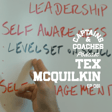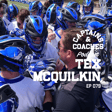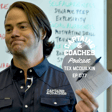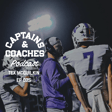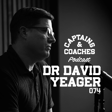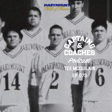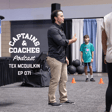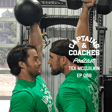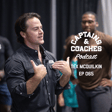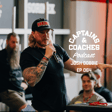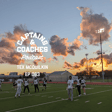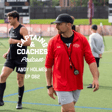Introduction & Coach's Journey
00:00:00
Speaker
first half of my coaching life, I was spiraling in. So I was gaining all of this knowledge, doing the old method, right? So I but i was observing, I was learning and developing on a long scale, a short scale, but also a long scale. I've been spiraling spiraling in and gathering information. The second half, I'm now spiraling out.
00:00:18
Speaker
which is the new method is trying to teach teach to leaders and other coaches. One, to notice. Two, to educate themselves. And then three, to ask and gain ah wisdom from someone who's been there for a long time. Welcome to the Captains and Coaches Podcast, where we explore the art and the science of leadership through the lens of athletics and beyond. I'm your host Texan Quilkin, and today we visit the hilltop at Georgetown University in our nation's capital.
00:00:44
Speaker
and sit down with my longtime friend, Coach Mike Hill. Every Christmas, Mike and I make it a point to connect for a workout and share our goals for the upcoming year. And this time, it was no different. We just decided to turn it into a podcast. Mike reveals his quadrant method for goal setting and the tools he's used for over his 20-year career at Georgetown to shape not just athletes, but generations of coaches that have joined the ranks of the Iron Hoyas. The self-proclaimed theoretical physicist Mike exemplifies what it means to be both a lifelong learner and a very impactful teacher. Join us for an intimate conversation about building lasting legacies, the art of spiraling out, in control, and a list of acronyms to help gauge your coaching skills and leadership abilities.
Sports Trends & Personalities
00:01:33
Speaker
With that, let's hand it off to Coach Hill. Ready, ready, and break.
00:01:40
Speaker
Mike's never played pickleball. Here's my hot take. Never. Just like the explosion of CrossFit, pickleball is facing that, that same just freaking skyrocket to the moon. Cause you're taking a lot of Narps, which is an acronym, which we're going to get into for non-athletic regular person.
00:01:59
Speaker
it is not a high skill sport. So you can get really good at it really fast and find success. You get a dopamine hit and then you want to continue into it. The challenge is it becomes your personality. So I could have taken the word pickleball, cut and pasted in the word CrossFit for that same thing. And we'd have the same, the ARP.
00:02:22
Speaker
non-athletic regular person gets success early, dopamine hit, and it becomes your personality. It's still fun. It's still cool. I just am challenged when people wait take it way too seriously because it's it's just exercising. And at the same time, like don't let it become your personality.
Career Development at Georgetown
00:02:40
Speaker
You can still have fun with it and enjoy and challenge and compete.
00:02:44
Speaker
Just don't let it ruin your Sunday. So is it a progression from ping pong or a regression from t from tennis? I would say both of those are the ends of the spectrum. Right there in the middle is pickleball.
00:03:02
Speaker
I'm more of a ping pong type guy. I'm on that end. Oh, I love ping pong. Welcome to another episode of the Captains and Coaches Podcast. Take two on this episode. Thanks again, Mike Hill. do we're We're dropping into Georgetown University and this is ah humble beginnings for me. And then every single year that I'm here for the holidays to visit my sister.
00:03:25
Speaker
make it a point to come in and grab a workout with Coach Hill and just catch up on what has been and what's ahead for 2025. So thank you. I mean, it's 2024. We've been doing this. I i met you twenty the summer of 2012.
00:03:41
Speaker
2012. Yeah. So over 12, about 12 years ago. Yeah. So the, an intro and I, I got to thank Devo girlfriend at the time was one of Mike's former athletes who reached out and made a connection and, uh, it has changed the trajectory of my entire professional coaching career.
Adapting in Coaching Roles
00:03:59
Speaker
Course correction. Yeah. There's a course correction on that.
00:04:02
Speaker
Yeah, she crushed it, worked very hard and for for me here at Georgetown. And so when it came up and we had the position open, it was a no-brainer for us for you to come in. And so you took it and added value where value was needed um and then ran with that, you know, um the good and the bad, both sides of that, right? So I guess, yeah, being here for better part of 20 years. So ah being at Georgetown since 2004, I got here in 2004 with Coach Augie Morelli was here, there was only just him and another volunteer Harrison Bernstein. So I was kind of the first intern ish here in 2004. And then in 2005, I got hired on so I basically worked here for one year for free, 19 years paid.
Creating a Coaching Philosophy
00:04:47
Speaker
ah And so really I thought after the first year, I was going to leave and go somewhere else, but that turned into the next year and the next year. And then 2010, uh, I became the head here when coach Marley left. And I guess I've been here ever since. I guess I could say this statement, I could stay here forever, but I could also leave tomorrow knowing that I did a great job with what I had. So, um, kind of, I guess, live that every day. I know the origin story. It was a lot of email outreach. Oh yeah. Just.
00:05:17
Speaker
shooting in the dark and then Augie was one of the people that answered the email. yep So now you take it upon yourself, every email you get, you make that that conscious effort to include them or at least give them an opportunity. yeah That was in, so it was like between 2002 and I'll say 2004, somewhere in there, maybe 2003. I just printed off a list of every strength coach in the country and started doing my own ah background or open source information ah check on every strength coach and just really finding the websites, finding their phone numbers and sending out multiple
Mentorship & Leadership Styles
00:05:52
Speaker
emails, ah just highlighting and crossing off places where I could live, who got back to me. And then if they did get back to me, I would plug their number into my cell phone,
00:06:01
Speaker
Back at the time, it was a flip phone, and Coach Morelli was one of those ones who got back to me. And he called me 5.30 in the morning, California time. I was in San Francisco at the time, 8.30 here, and i popped up as Coach Morelli. And I just ah knew right away, I answered the phone, ah picked it up, and I guess, you know, I drove across country and came here.
00:06:22
Speaker
What was that turnaround, from call to day one? So I told them I could be here tomorrow. so And then I quickly had to call them back and say, well, it maybe take me a couple of days to get here. um But mike the people who are living with my cousins, um and they were moving as well. So it was kind of a perfect time for all that. And so it took me about roughly about a week and a half, two weeks to get across the United States. So I just packed up all my stuff. My parents were definitely supportive on that.
00:06:51
Speaker
And my car broke down twice on the way here. One's kind of in Utah and another in Omaha, Nebraska. And then my wheel flew off oh god in on the Pennsylvania turnpike. So I went through some trials and tribulations of my own to get here. but And i when I got here, I think Augie forgot about me.
00:07:09
Speaker
but It's all worked out well. That'll happen. Yeah. I've heard you spoke about creating a philosophy through Augie Aschel, where it's an environment for coaches to learn, fail, and then learn from those failures. With, I mean, scholarship athletes, that that's a tough lesson, because you have the responsibility to take these kids where they can't take themselves. You can't risk injury. So speak to us about that failure process without putting kids in a position to take them off the the court in the field. It was, you know,
00:07:41
Speaker
Augie kind of being the alpha strength coach um and Shell meaning I'll say everything around strength and conditioning, not just sports medicine, not just sport admin, but a lot of the distractions. He kind of simplified all of that and just, you know,
00:07:58
Speaker
gave left and right parameters, but also a ah floor and a ceiling for you to coexist in, and he would just kind of shepherd you back and forth, um give you small little ah talking points. um He was very big. he didn't He didn't name it this, but this is what we name is like auditing lifts, watching lifts, watching coaches, what they're doing, how they're moving around.
00:08:20
Speaker
um And he would kind of course correct you and and just kind of push you into different ways. ah And really, that just, you know, worked organically to where you organically work yourself in or you're going organically work yourself out of the position, you know,
00:08:38
Speaker
um And I guess if you look at it as a box, a left and a right, and then a floor and a ceiling, um that's kind of the shell, is what he had given. I really like that. And he the important thing is he's there to help sheer so Shepherd. So speak to us about his ah is hot and cold, his temperatures. it Was it always one temp? Did he turn up the heat sometimes? Or was it more of a ah guiding mentor, guiding light lighthouse?
00:09:05
Speaker
I think he did all of it pretty well. um He had kind of the three-level voice. I would say the alpha, which is the head. He had the assistant, but then he also had the personal voice. He definitely was a master motivator. He could definitely turn it on, but then he could definitely cross his arms and give you a good stare that would just tell you everything that you needed to know without needing without saying anything. Good ah body language.
00:09:28
Speaker
um So i you know I think it was the way he was coached, too, with Coach Bill Starr at Hopkins is where he went to school and where he trained with ah the Starman. And I think that's kind of how he coached, too. He didn't necessarily have to be a screamer and yeller, but there was different ways of motivating each yeah athlete, but also motivating the room, but motivating the group, but also motivating the individual. So that ah
00:09:59
Speaker
That was what he was very good at. And now you know he's he's gone and moved on to another profession, and which is the ah CFO at University of Virginia, um which speaks to his high intellect and is his high EQ, but also IQ.
Old Bull Training Program
00:10:16
Speaker
So i learned I learned a lot just from being in it, but also just watching him and having little conversations throughout the years, um even when even when he was gone, you know just calling me and just just bouncing off and taking counsel from myself, from my peers, but also outside from him.
00:10:36
Speaker
Time out. What if I told you the path to transformation isn't about rigid schedules and crushing yourself daily in the gym. It's about moving with purpose and intention. At captains and coaches, we understand that true leadership starts with embodiment. When you look the part, you lead the part.
00:10:53
Speaker
but here's what makes our training programs different. The old bowl training program adapts to your life, not the other way around. Choose your own adventure, daily workouts less than 60 minutes a day with rep schemes that flex depending on your energy and feel.
00:11:07
Speaker
because we know sustainable growth happens when you become a self leader and stop missing workouts. This creates a powerful ripple effect to change how you move. You transform your mental, emotional state, transform your emotions and you elevate your decisions, better decisions. That's when your entire quality life shifts. Join the old bull movement. Let's build more than a stronger body. Let's create a purposeful, powerful life on your terms. Click the link in the show notes for a seven day free trial to old bull program.
Emotional Intelligence in Coaching
00:11:38
Speaker
today. And now, back to the show. Ready, ready, and ready. As a coach getting into the industry, you're obsessed with programs, X's and O's. And I imagine that you presented programs or or thought and felt the same thing, but then just this this EQ and these these three different voices and levels,
00:11:57
Speaker
did he tell you these three levels, or did it take you time to to feel and take note of all this emotional quotient that he's pouring into you? No, he actually... So I would say, you know, it just took it took me as the observer to see that and see what he was doing. You know, he coached me differently than, you know, Coach Foster. He coached me differently than ah Coach Johnson, Carl Johnson. um There was... It's just like kind of like a good psychologist. They meet you in the middle, meet you where you're at,
00:12:27
Speaker
and they push you and pull you and left and right. I think it comes down to, and coach Jesse Wright wrote a great book about soft skills. And I'm just forgetting the name of the book, um but the intent, sorry, the intent is to grow. um He wrote a great book about soft skills. That's what, you know, the X's and O's, ah that was the price of admission, to be honest with you. Everybody should know that. You should all pass certification. You should all, everybody should get a four year degree. In my opinion, everybody should be certified.
00:12:55
Speaker
ah That's kind of the price of admission. The soft skills and all the outside stuff, so it's not about the program, it's about the program that you run. um All of that, how it's run, how you use your soft skills, how you organize a session, ah how you treat people, how you look them in the eye, shake the hand, all that stuff, remember their name. ah That's more important.
00:13:18
Speaker
then I guess sets and reps and percentages and phase potentiation and all of that stuff. All of this stuff is important, but it's not gonna work unless it works, right? So you have to pour a lot into the program, but also yeah you still have to do the science, I guess. yeah It's both. um That's kind of a catch-22, but he was more more of the pole program. How are you running it? What does it look like? um Are they even following you? Not the program on the paper. Yeah, not the program. The whole program. The team. The program. ah program The door-to-door concept. Not the movie. Yeah.
00:13:52
Speaker
the program great movie great movie uh this i've referenced it a lot this week uh a place at the starting defense place at the table so speak to us about reading the room because it started as you were stepping into a collegiate weight room for the first time then now you are leading a collegiate team But now you're in a role in a position where you're you're leading leaders, you're coaching coaches. So speak to us about the different layers of reading that room that you're into now. So I guess when I first came in, I'm originally from Fort Dodge, Iowa, which is a very small town, but um I had a farm. I didn't live on a farm, but I had to work on a farm. So like hard work, showing up early, doing your job, doing what you're told, um all that stuff helped me out.
00:14:36
Speaker
in California when I was at 24 Hour Fitness, but also here when I took my first job here at Georgetown. And so Augie recognized that. So some people wouldn't show up on time, right? They wouldn't deliver. They wouldn't do the hard work. They wouldn't mop the floor. There's certain things, right? So I just, I did all that. ah So that was kind of situational awareness and I'll say,
00:14:57
Speaker
ah For me, it was more, and this took me a while to kind of learn what I did, was it's really called the old method, so OLD. So ah first I observed, I came in, I observed what was going on, um who were the stakeholders, how did the room work, right? how did How was the organization of the organization, the university, all of it. um Observe that first, and then I learned what needed to be you know added to that, let's say, ah you know what the coaches wanted. I learned, I listened. ah I wrote down notes. um you know I kind of created my my own list of things of what I would do if I became the coach. um And then I developed that, so D, so the last portion. So I observed first, I learned and listened, and then I developed what I thought
00:15:54
Speaker
would move us into the next, or to the move us forward into the next direction. As you're introducing this stuff, I'm reflecting on my Georgetown time a lot, and just that that observe and learn, because I felt, these were my first scholarship athletes, so I felt ah felt nervous in everything I was applying, right? Jumping from Division III, strength coach, sport coach to Division I, that was a major jump to me, and so taking
00:16:24
Speaker
things very seriously, but still finding gaps.
Structuring Effective Sessions
00:16:27
Speaker
For me, it was the warmup. Yeah. So this was, okay, we're going through the same routines. And then the coaches are, they're basically just, they're in a ah sewing circle, just tatting. And then me as this, this new guy, I felt an opportunity because what they were doing and it's, it's still every single warmup i I lead to or stepping into a new team with, I see the same thing. They do steps versus reps. So imagine we got 15 yards and we're doing walking lunges, they lunge, walk one, two, three, four, five, six, seven steps, take a left leg lunge, and then walk. Oh, I've hit my 15 yards. Did my but major pet peeve. So reps, not steps. So stepping into the existing warmup yeah and just getting the guys to actually do the warmup.
00:17:12
Speaker
And then eventually evolving to introduce new movements in there that I felt based off watching their lift. Hey, this warmup can prevent where they're failing here. I'm wasting too much time coaching here. Let's have a movement solution for that. So major gap in the the beauty of the coaching staff. They're like, yeah, that sounds good. Go for it.
00:17:32
Speaker
So then finding an opportunity for for me to develop help develop the the initiative of the program within a safe marker, safe space. Yeah.
00:17:44
Speaker
Yeah, the warmup is, ah for me, so ah something that doesn't get talked about enough, and I don't know if you're gonna talk about this, is ah kind of ah the session organization. How is it organized um from from door to door, door in, door out, right? Is it just, you know, a loose warmup or no warmup? um Is it command and controlled? Is it formalized? um Are you...
00:18:09
Speaker
Are you giving a brief at the beginning? Are you just kind of explaining the lift at the end? Are you debriefing them? All that stuff. I think it's all important in the kind of the meat and potatoes. Are are you ah you know detaching yourself from from the lift and going and checking your phone or going out and going to the bathroom? All that stuff. How how that whole thing is organized is something that And we kind of get an hour lift, 50 minute lift, but how is that organized? What are your check marks off? What are the first five minutes need to look like? What are the first 10 minutes need to look like? right What is the energy audit of that lift?
00:18:43
Speaker
ah all of that stuff. I think it's super important. so yeah Yeah, and having i mean even having that checklist is a new coach stepping in. you fate You fall at the margins of your experience, so wherever they're coming from, they they think that's the way, and they're going to aim to apply it.
00:19:01
Speaker
whether that's from an athletic background or an interest in certain sport of lifting, Olympic weightlifting, powerlifting, et cetera, they think that is the way and they want to bring it in the door versus, I mean, whatever the the team culture existing is. Yeah. This is my favorite part of the annual conversation we have, your quadrants.
00:19:24
Speaker
Yeah. So setting setting goals for the year. this is This is that time of year for everyone.
Goal Setting with Quadrant Method
00:19:29
Speaker
And you've got a system that works phenomenally. So walk us through the quadrants, 1, 2, 3, 4, and then some things that you are aiming for for 2025. Yeah. I guess if you ah look at like an XY, I guess, plot or quadrants, um top left, top right, bottom left, bottom right.
00:19:50
Speaker
ah You know, my first one is is my professional goals. Like what what am I ah trying as a professional to move towards? One is write a book, another one is to get a PhD. You know, um those those two things, professional goals, there's others, but those are the numbers number one and number two. The next would be team goals.
00:20:11
Speaker
So as a team, that changed because now I stepped away from basketball. Now somebody else is doing basketball here. ah And so I am just overseeing the whole department. So my team goals have kind of changed from a team to my ah staff as a team.
00:20:26
Speaker
ah those team goals, ah sense of urgency, right, attention to detail and team before self, those three, I think if you can create that with any situation or any issue, right, a sense of urgency of getting this done, and attention to detail of this or team before self, I think a lot of things fall into place, those team goals. um And there could be others, those are just the three that I've, you know, stacked with. ah The next one is projects, which is What am I doing? ah What am I currently ah moving the needle on day to day, I guess, little sitting projects that kind of come to me? You know, one thing is, you know, we me being here for a very long time, the ah the Iron Hoyas Fund of giving back, like you're at where you're at now, how do you give back to what
00:21:14
Speaker
um besides the podcast, but how how do you give back to the organization that helped you out? So how can we raise that and move that forward? um So it directly helps and develops other coaches coming up the same path that you did.
Importance of Community
00:21:30
Speaker
The next is self improvement. So this is, you know, it could be anything from a new certification, it could be something from, you know, books trying to read, it could be, you know, some type of a seminar,
00:21:46
Speaker
or something that I need to work on personally, um which is right now I'm looking towards to get my USAW level two and then an FRS. So yeah. What's the FRS? Functional ah Range Strength Certification. So it's the next thing of an FRC, Functional Range Conditioning. Oh, okay. You got to explore those. Yeah. So many certifications are popping up. This is good. Yeah.
00:22:13
Speaker
got it yeah Got to explore a lot. I've got a full list of professional, and then where where I consider team, I'm i'm doing my part to continue to reach out to to friends and mentors in the industry, keeping my college lacrosse teammates together the best I can. Because we had a system in place, and of course, and we couldn't travel anymore due to COVID, and then Dude started having kids, so now how do we continue to to grow and develop together now that travels out? It was just probably healthier for us all, but at the same time, like I want us to to continue to to build our teams together, of teams our families yeah together, considering us a family.
00:22:56
Speaker
And then then professionally, because there's a lot of good mentors that help me along the way. Well, podcast is one way I can continue to do that. But then it's it's conferences or ah different brands that I continue to connect with. And then, hey, I know some cool guys in the industry hand off these brands, shout out Yeti, to absolutely awesome professionals in the industry that are doing amazing things. yeah So aiming to to to build that network, that connection with both teammates, my my professional friends, and then ah my brand continues to grow, continue to help build others' brands. as I mean, life's a hill. That's a brand worth getting to know. Yeah, I guess that I'll take both of those. ah you know The Quadrant kind of just came up a way for me to filter a lot of things and just put it out there and put it on my whiteboard. So I'm looking at it every day. so
00:23:52
Speaker
You know, maybe that destination is super far away, but at least I'm looking at it every single day. I'm looking at that map. I'm moving the needle in certain different ways because there's so many things that I want to do. um Some days I get frustrated where I haven't crossed anything off in a long time, but other days it's like, hey, I just hit those two things out this month.
00:24:10
Speaker
um you know So it ah it's just it's it's a way for me to filter that. um And I guess you know bleeding into the next thing with the license
Social Dynamics & Team Settings
00:24:21
Speaker
to Hill, which is my Instagram handle, which started as a play on two different things. One, 007 and my dad's love for those movies, which I think everybody growing up during that timeframe loved that stuff and Ian Fleming and whatnot. yeah um So that, but also the Beastie Boys, right, is my first tape ever as a young a young kid.
00:24:45
Speaker
um I didn't know this. Well, my cousins bought the Beastie Boys license to ill tape for me and I blasted that. I can't even remember how old I was. I was probably seven or eight or whatever. And my cousins gave me this and my parents were like, what?
00:25:01
Speaker
Is this is this pre parental warning? Uh, I still have the tape. Um, so I believe there was explicit explicit lyrics on there. Um, but you know, an eight year old fight for your right to party is like, if you're blaring that and your parents pride, like what is going on here? So it's kind of a bleed on those. And then obviously my last name Hill.
00:25:20
Speaker
So License to Hill um came up with kind of like a brand of of this. And then my ah Instagram, you know, but me being in basketball for however many years, I didn't really want to be that person that was on there promoting. I hate when people say my athletes, and I shouldn't say the word hate, but I say when people say my athletes are doing this or my athletes but the athletes that I was working with I'm not the coach that you know is on Instagram and showing pictures of them so when you go on there everything that's reposted was posted from somebody Georgetown basketball did and then I reposted it um to mine I wasn't the guy that was
00:25:58
Speaker
downgrading coaching and filming at the same time. um You know, I was the guy coaching and not holding my phone or had my phone in my office, which is I think super important. um Because we spent so much time these kids spend so much the athletes spend so much time in technology. It's like for that 50 minutes or that hour.
00:26:17
Speaker
you should take them out of that technology. but um So Instagram ah came up with just a couple of different things. ah One were shoes and the other was books and then the other pro promoting podcasts and things like that. So um yeah, I tried my best to to push that forward, but i'm not so I'm not so good at it, I guess. Your focus was on the team. So yes one one thing I absolutely love is team dynamics and why why I love sport.
00:26:45
Speaker
It's not only the strategy and the chess match between the the coaches, it's the the whole off season to prepare. You've identified limitations. You've identified where you can improve. So now we got time together to work on all this stuff. yeah And so ah just looking in the periphery, I know you've done an amazing job with certain teams. And one of my favorite things that you've done is the breakfast club. So speak to us about little things like the breakfast club that you're doing as, as the glue guy.
00:27:18
Speaker
to help build and bring these teams together, especially in the day and age of a transfer portal and all the other things that can go wrong. I think a lot of teams now, I mean you know i i definitely wasn't the one who originated it, but a lot of teams now are doing it during the summertime, ah which is 10 weeks of summer, is two things. Athletes are they're not eating breakfast, but they also need to gain weight. so um It was just kind of, ah it was born out of a necessity to ah make sure that they were doing two two of those things and make sure we are maximizing our potential within the summertime, within that 10 weeks. So really the breakfast club was, instead of getting them up early and lifting weights or doing conditioning or whatever we were doing for that day, um the first thing that they had to do was get themselves out of bed and go eat breakfast with us as a group. Some people, and I'll say about a third hated it,
00:28:12
Speaker
a third loved it, and a third were really kind of impartial to it. ah And so the people who needed it benefited, the people who didn't need it benefit, and the people who didn't care benefited from it. Right. um so All in all, it just kind of it it created good habits for that 10 weeks. um It got them up, it got them moving. If you're up early eating breakfast, you're more likely to stack other habits and move things forward and push things in ah in a different way had you slept in and just got a crappy workout in, slugged in, pushed through the workout. Gone out the night before? Gone out the night before. um Wake them up at seven or eight o'clock.
00:28:52
Speaker
which we'd done before, ah do a workout and then they just go home and sleep. but um So it it ah it started really out as kind of like a ah necessity and then it just, you know, it was born from there and it started, you know, that went into also stacking other habits like journaling, things like that. So we, during that 10-week summer,
00:29:12
Speaker
um you know, we had the guys, we got them journals. And so we put a quote of the day up on the board every single day. So that was kind of the starting point for explaining the lift or the briefing of the lift. And then it was kind of the after action. You know, we'd talk about the quote ah at the end of the workout. So it was kind of like the knowledge nugget for that day was to leave them with something. And it usually originated around that quote. So we would talk about it, be able to see it. um It will be up in the gym.
00:29:40
Speaker
um And I definitely wasn't the first person to think about that stuff. Kind of got the idea from Ryan Horn, um who put that up, who put up the kind of the quote of the day. And then once he saw it and I saw the success with it, I was like, wow, this is this is a good ah stacking habit ah area that I think athletes could hold onto. And so we use those journals to write that down. And then we had athletes come up with their own.
00:30:08
Speaker
And that's where it's it's the magic happens is when when you start having the athletes who care about that stuff, who start coming up with things on their own. And some people, you know, some of those athletes, and we only did for 10 weeks. So some of the athletes did not like to journal, but they were kind of You know, it was it was a habit that they did just in the weight room. Some people did, um and they're not going to reach everybody. you ah and and And the whole point of it was just to get things started for that 10-week summer, for that um initiation, and then go from there. Do with it as whatever you want to. um But maybe later on in life, you'll come back to it and think about those things and think about those quotes, and maybe that'll form something later on in life.
00:30:52
Speaker
Yeah, and that's and incredibly important for these young men because these are anchors, these are core memories that are that are healthy. So they're they're putting in the work, they're waking up, they're putting on weight, they're training, they're journaling. So all of these are are healthy behaviors that they can come back to later in life. Maybe maybe things aren't going as they planned. Okay, when was?
00:31:17
Speaker
life in order. yeah It was one, two, three ways to start the day. So it's important for those anchors. So that that's why I love high school athletics as well. I love college athletics is for young men and women, we're creating those anchor behaviors, those core memories that are healthy. And this is where coaches can ruin that. They can take advantage of their responsibility. They can talk down, they can demean, they can just play power dynamics with these kids. Yeah, absolutely. And then turn those into to anchor still anchor core memories is just on the negative sense. So they have and develop a unhealthy relationship with hard work, or authority, or being yelled at. So it it can go either way. So that's that's the important this why good men like you are here. Thank you. So
00:32:10
Speaker
the What I also love about teams dynamics is picking captains. Every team is different and you've been a part of some fantastic Hall of Fame coaching staffs and Final Four runs historic stuff. So speak to us about the different ah ways that captains were chosen.
00:32:30
Speaker
and different things that you've learned along the way that you can hand off to coaches. Speaking can specifically, I guess, with basketball, um I've seen the gamut. I've seen captains being picked by the coach. I've seen captains organically work themselves up. I've seen captains self-organize and they name the captains.
00:32:49
Speaker
I've seen no captains at all um and so I guess you go from where big coach Thompson how he named his captains to JT3 how he named his to coach Ewing how that worked out and how he named captains or didn't name captains. um I think you know the captains are normally in basketball. They're normally the top players, really. And I'll say all two caveats. Either senior players or the top, right which normally you know is on the basketball court, right that captain, um which is needed. You need the person who's going to get buckets, who's going to score, who's going to be that playmaker, the dude who's going to be that captain. But really, everyone knows the captain underlying.
00:33:33
Speaker
ah who is actually doing everything right, who's shown up to practice, who's going to class, who's doing all the right things.
Mentoring Interns & Young Coaches
00:33:41
Speaker
right Hopefully there's everybody has somebody like that on the team, but most likely is not the one who's the playmaker, who is the number one. um So I guess I've seen a delicate balance between all of it. you know When we were going ah very well,
00:33:59
Speaker
when things at Georgetown basketball were going very well. um The captains, and I believed, correct me if I'm wrong, was Jeff Green, um but also was John Wallace. um And both those guys were model citizens, and they were playmakers. So it was a very healthy mix of both. um Where I've seen other teams, won't name them, is they've had captains who are the worst outside.
00:34:23
Speaker
and outside of the locker room. um We still won some games, lost some games, but I think you need a good marriage between the two, between the on-the-court ah performers and the off-the-court performers. Sometimes, and I've heard it spoken this way, there's the best guy on the team, then there's the best best guy for the team. Yeah, I like that. Yeah, so Martin Rooney is from one of his books, and sometimes, and I'm not mad at two captains system on that,
00:34:52
Speaker
to where you you have the guy who is the action, the the behavior specialist. He's doing everything right and making sure, doing his best to shape the behavior of the team and the squad. And then the guy, the dude still respects that. So they hopefully have a good relationship and balance that off one another. We know as strength coaches, there's always that.
00:35:14
Speaker
person that works the hardest in the weight room, that is probably not the one on the field or court that is that is the number one. um But you know I guess that's what the beauty of the weight room is. We call it the weight room sheriff program, but the weight room sheriff is the person who is ah you know the the the the model citizen within the weight room structure environment, who is doing all the sets and reps, who is holding others accountable, holding themselves accountable.
00:35:43
Speaker
um you know, doing all the right things that you should be doing, but maybe just doesn't have that talent or the skill on the opposite side. And so you want to find ways to foster. That's why I love the weight room with that um because it gives another, it gives an athlete another chance to excel in something. And I wouldn't be here if it wasn't for me. I mean, I was good at everything, but not great at anything. um But the training for me, I love the training and I started, uh,
00:36:09
Speaker
a long time ago. I've been training, I don't even know how many years now, but it was sixth, grade sixth seventh grade um when I started and there was a coach, a former Marine, Mr. Bristol, who had an early morning lifting program. And so I would, my parents thought I was crazy, but I would wake up at 6am and go there early. And then we had we had this little breakfast program that we would eat breakfast afterwards. um But it was just basically like Nautilus machine calisthenics. um But we were pumping iron at seven years, six, seven years old um in the morning time before school, which is crazy.
00:36:46
Speaker
crazy to think, you know, and I ah this guess i've I've never stopped. Yeah. Which is wild to even think about um nowadays. And so the training for me was always, and I'll say training or workouts or fitness or strength conditioning or sports performance or whatever you want to call it. um It was ingrained in me at a really young age. And so I've just kind of taken that and You know, I wasn't again, not the best, not the great at everything or not great at anything, but good at everything. Um, and, and I was one of those ones who.
00:37:19
Speaker
who got brought up within that weight room, I guess, sheriff position, where I love the training. I did not waver on any of that stuff. I tried to do extra, ah spent a lot of time um on my own training and doing things whether right or wrong. And so kind of forged my way into this position. And then able to read the room and find the guys that still have that same connection too to training. Yeah.
00:37:45
Speaker
And then helping them work on now their, their leadership, their ability to motivate individuals to get them to focus and move with intent as well. The important thing for a coach in that role, who's got a, a weight room sheriff is training them on how to build guys up versus bring them down versus the, Hey, why can't they just do this? So you bring your negative thoughts to that weight room sheriff that starts to build resentment in there.
00:38:13
Speaker
if they could just, why can't they, or they should, if only, yeah language like that, spoken from a coach to a captain, that's that's negative, and that's where you start to build in. Because he, whether he realizes it or not, or she, is looking up to you on how to lead. So that, effectively, you're teaching them how not to appropriately lead and motivate. And I see this all the time within captains who then start to bark and yell at the teammates,
00:38:41
Speaker
fresh Freshman, do this. Go get this. Versus, hey, let's get this. Or calling out guys specifically, hey, Mike, I need you to go get the get the goals. Get the ball bucket.
00:38:54
Speaker
versus freshmen, go get the ball bucket. yeah It's probably much like being a father. yeah gee Every little thing you you say or do, they're picking up on and yeah observing and watching and then that becomes the norm. Hopefully it's not bad words. I'll say, and when you say in that, there was not an intentional ah knowledge transfer ah point with this, but Augie used to always say to athletes and to myself, can you do me a favor?
00:39:22
Speaker
ah He would say, hey, can you do me a favor? Can you go and pick that up? Or hey, can you do me a favor? Can you mop this floor? Or hey, can you do me a favor and do this? ill never a it There was an intention with that, but the way he phrased that... um you know, I still say the same thing. Hey, can you do me a favor? Can you take that, put that bench back? Or can you do me a favor? Can you move those plates over there? And I think the way how you phrase that in verbal judo, how you talk to people, and how you phrase things, um definitely matters, right? I was not
00:39:54
Speaker
the coach that was going to come in here and scream and yell and give you directives and or hand you a sheet of paper that says all these things need to be met otherwise you're insubordinate. It was more I'm going to let you organically work within the wild environment that is the strength and conditioning that is the weight room um and I'm going to course correct just like Augie did left and right.
00:40:17
Speaker
There's a floor, there's a ceiling to this, right? And you need to work with inside that shell or that box or that proverbial square. um and then help you, guide you in, guide you out. Some people can't handle that. They need the left, they need the right. They need to be told that you need to check mark all of these things off. And so, but that's not my, that's not the way I grew up. That's not the way I was coached. Um, and I think for me, it's the best way teach and move the education of a, of a strength coach. just I concur. And it's, it is a mix of autonomy within walls and there's six levels of, of, delegation. So I encourage everyone that's listening, Google literally six levels of dedication and the level one is do as I say. So you are literally handing them exactly how you want it done and eventually works up to level six which you probably don't have a lot of level sixes out there which is it's full trust and control so it grows in that and ah it's it's definitely a tool
00:41:19
Speaker
And I like that if if coaches are in that level one development and you're in say an eight week summer program, I think you're wasting your eight weeks because that's not real coaching. It's dynamic. It's fluid. If I see this with one particular athlete on the program, it's not going as I intended. Okay. We're going to course correct in mid session. That's coaching. That's development.
00:41:44
Speaker
So the awesome experience I had. So at Georgetown summer, I wasn't working with a football team. So I took a summer off to go down to University of Texas, take an internship, ah Jeff Madden and Benny Wiley. And so it was a ah mix of, we had a specific program.
00:42:02
Speaker
But you got 150 dudes sweating in humid environment. I mean, we're talking Austin, Texas, 110 degrees. it it was a It was chaos in an an organized developmental way. But then Georgetown prepared me to succeed there and then gain responsibilities through that internship to where it was trusted by Mad Dog and Benny Wiley to do certain things that they asked.
Evolution of Coaching Through Mentorship
00:42:29
Speaker
I was the guy they looked to.
00:42:31
Speaker
And then what was cool for me for Madden, all the strength program was written and then he would just watch and observe. And then we would go out to the, the DKR stadium, weight room, right to the football, like game field was where we did all the conditioning and he would just have it in his mind. So I was right there next to him and I just had everything he said. I had to write it down and then, uh, we'd set up the guys would do it. Then I would take all that and I had to type it up.
00:43:00
Speaker
for him and basically build his summer workout training and program book. ah And then like catalog that. So yeah just watching, observing, he was like a captain of a ship. Oh, the wind's going this direction. yeah We're going that way. So it was just cool to observe by the feel. And then um yeah always took the time that day and to And I have, I still got all the sticky notes that have, okay, here's the question I'm going to ask him as we take this long trek ah back to the weight room.
00:43:33
Speaker
So it took my personal time to, to try to get some mentorship from coach who's been around since the beginning. He hadn't been back Brown way back in UNC. He's one of the first strength coaches. All that to say is, is like just being told delegation level one, that's not coaching. If I'm still in college, maybe for my bachelor's and I'm freshman, sophomore, junior, sure. Level one. But a lot of the professionals that you're bringing in, they need more than that, which I mean, they get.
00:44:03
Speaker
they They get the opportunity to coach and lead here, which is awesome. we have 30 sports here. So I'd say you know half full-time, half part-time. So you're getting a good mix, but also most of our full-times are fully embedded strength coaches with with ah sports. So part-time staffers are having ah you know multiple sports. They are kind of have jobs outside of here. um you know it's it's it's hard to It's hard to create positions.
00:44:34
Speaker
Um, when there's a lot, like I said, the NIL, the transfer portal, the house settlement case, all of that stuff. There's a lot of uncertainty with roster management, stuff like that. Um, but coming here and having, uh, somebody like myself to help, you know, guide you, but also have coach Foster here to help guide you with your programming.
00:44:53
Speaker
Um, as well. So I think we have a good setup to where, you know, we, we expose you to something, to a group, uh, or a team, a group or a team environment, uh, and then to help support you in whatever area you need to have support in. It could just be, you know, you need to get your receipts and your data collected.
00:45:16
Speaker
It could be you need to work on your soft skills. It could be your session organization. It could be your three level voices. It could be your programming. You know, I would find most of the time, you know, coaches coming in, they think they know a ton about programming, and then you put them in front of, you know, 80 kids or athletes, and you find out that quickly doesn't work. It quickly, you know, doesn't mesh well or and or, you know, you are giving them too much autonomy and or you just become a DJ. And I guess that'll lead into the next thing. Are you, are you doing a couple things? Are you a CDCer or are you a DCer? And i'll so I'll preface this by saying,
00:46:00
Speaker
ah you know, with I use a lot of acronyms and trying to write a book, that's part of my professional acronym Academy. um But one, are you, are you ah CDCer? First, I'll say first, the DC deer. The DC deer is a DJ, right? They create conversations and they create distractions. So everyone knows that coach that just turns on the music, they create, come and walk around, they have conversations, and then all of a sudden they're distracting, and then ah you know, the the workouts gone a different route. The other route of that CDCer would be somebody who's concentrating on coaching Q per minute, um who is directing the lift or directing which
00:46:41
Speaker
ah um, you know, the, the different coaching cues or different aspects of the lift or the direction or, um, the, uh, energy audit of that lift and then coordinating everything altogether from the start end or the finish, right? So if you're doing one or the other, the session organization on that, um, you would want to be more of a CDCer really. It's a bad acronym, but, uh, you know, session talking about session organization,
00:47:11
Speaker
You know, from from the beginning, a lot of times, strength coaches, they'll have the card. They'll explain the lift at the beginning. They'll let them go. They'll be a DJ. And then at the end, they'll complain how bad it's gone. So you'd be an explainer and then a complainer, rather than, and I'll use, I guess, a couple of military terms, a briefer at the beginning. When you brief, when you explain things, hopefully they understand it. But when you brief, you should be briefing in a simple way to where they're understanding all of it, right? And or you need to stop.
00:47:39
Speaker
um and maybe course correct yourself maybe stop in the middle of your session and ah bring them all together and break it down and give them a kind of knowledge nugget and to move forward. So yes. And that that's the important thing. And that's high social self-awareness and social awareness. Cause you may have felt that you taught this lift or said the, the intent of the program. However, athletes are not executing as well. So I could get mad at them for not this, not going well or hold the mirror up. Okay. Yeah.
00:48:13
Speaker
timeout, I'm going to slow this down for you to make sure we are hitting all the points, which in the long run is going to benefit them because then they'll understand it better at this moment in time. And then, okay, they're going to hold on to that nugget, hopefully. And then also realize when coach hits the record scratch on as the DJ, Oh, I better listen up because I'm not focused. Oh, absolutely. Like, and I think, you know, doing, uh,
00:48:39
Speaker
and every day telling the athletes or explaining things ah or debriefing them or after action report or however you want to phrase it. How did things go? How well? What do we need to change? right What are the nuggets? That's where the the quote came in or from with men's basketball or running a session was, let's talk about the quote at the beginning. Let's talk about talk about it at the end so I can leave you with something, some kind of a knowledge nugget.
00:49:08
Speaker
transfer or something to keep you thinking keep you engaged for the next time rather than just like you know complaining at the end of the lift and telling them this is terrible or hey this you know this was a great lift and maybe it wasn't a great lift.
00:49:21
Speaker
um you know So I think there's there's definitely how you organize that from from door to door, door in, door out, when they walk in the door until they leave um is is a very important skill that doesn't get talked about a whole lot. I see this with sport coaching as well. So I ah still maintain coaching sport. And then when I'm visiting schools, aim ah to observe a sports practice. i just Again, team dynamics, I love it. So what I find successful teams do within the sport practice is you have you have a coordinator, he's got the whistle and he's initiating the drills. If it's ah a one-on-one drill, he's initiating the whistle means go for this next group. The challenge is when the coordinator and then the the coaching cues per minute person yeah are the same person, then the my whistle stops, the whole team doesn't get to run the drill, but I'm coaching that one, two, that small group or that person.
00:50:17
Speaker
So now i'm I'm losing reps per minute because my coaching cues per minute is increasing.
Team Organization & Communication
00:50:23
Speaker
So if I have a coordinator running and the same drill I have a coach, okay, they'll run their drill, coordinator gets the other group going. And then I'm i'm right here on the side coaching those.
00:50:35
Speaker
Those two people, if it's a one-on-one, we're coaching just the offense for that. So then they go to the end of the line. They're thinking about what I just said, and then two groups have already gone. So that yeah flow, we're increasing the amount of reps because if we're, and I tell this to coaches, if we're moving, we're learning. So if I have a coordinator maintaining the reps spur per minute, and then I have a coach on that same drill doing the coaching per minute, then we're, we're going somewhere.
00:51:04
Speaker
What I really love to see is when they, the athletes, those are, though they're increasing that coach per minute. And now, okay, that coach can go off to another segment or another group.
00:51:15
Speaker
and have this impact if my leaders are starting to, if I consider everyone a leader, if they're starting to communicate what to do. But that that's an arm wrestle. that's That's almost a year in to develop a coaching culture. Yeah, the coaching cue permit is something that doesn't get talked about. We talk about a lot here. It's making sure that you're also ah If there was a heat map or a GPS attached to you as a coach, where are you moving around to have touch points for the athletes? for are you Are you neglecting one portion of the weight room just because they're good lifters or they're not good lifters or whatever? um Making sure that you're given each group, um each team, each individual something. It shouldn't just be a, hey, good job. Oh, that looks good. um There's always something going wrong or just
00:52:04
Speaker
saying hi, um you know, checking up on them how much weight they're doing, um watching sets, watching reps, ah you know, moving around. And I think that's that's important too as well because you can't just be the coach that explains the lift and stands in the same position all day. You need to move around. You be need to be dynamic um for that 45 minutes, for that hour, whatever it is. um And all the athletes should be seeing you, you know, every other set, I'll say. Walk, if you're walking around um and you should be saying, depending upon, that says that's scalable, really. Like with men's basketball, there's 15 guys and I had them sometimes split into groups. So I was all,
00:52:47
Speaker
into every single set and rep if you have 80 swimming and diving athletes in here, then yes, you should your heat map um should reflect a good sprawl across the the entire weight room. So um two things I think are very important. Yeah, yeah, yeah it It depends on the team and then how well you, you coach and depending on how you want to organize your weight room, as well as what the sport coach wants. Yeah. Sport coach wants. I recall, and I just remember this for coach Warren men's lacrosse. I was that, that first year, that first semester. Yeah. So we, we had a lot of fun, uh, getting quit, uh, installing a culture.
00:53:30
Speaker
I'll call it, yeah getting a lot of kids to quit. And then once the team was set for the spring, we had certain organization of the different weight racks where we had freshmen and lacrosse doesn't have a lifting culture, especially 12 years ago. So new kids that were on the program, they'd never touched a weight before.
00:53:50
Speaker
So we had a specific space in the weight room for those guys. And then as soon as Warren observed that, he wanted everybody together. yeah So then it was starting to put juniors and seniors experience lifters with these freshmen. So that was the mix up and the jumble to wear on paper.
00:54:09
Speaker
That's probably not the most optimal way to long-term develop these freshmen, but at the same time, okay, we're trying to install a culture here first, the program speeds for itself on that respect. Yeah. I mean, we did, so so with men's basketball, we did, I did, You know, I put freshmen with veterans at every single rack. So you were learning from, you know, hard, but the captain and then your coach, right? So the three differences. And, you know, what you want or what I wanted was for the, you know, the veteran lifter at that rack to be that coach, you know, when I turned around or I wasn't looking to help that freshman or veteran, of ah help that freshman and veteran relationship.
00:54:53
Speaker
um and foster that within the weight room because that's what they're going to be doing on the court anyway, or they are doing it on the court. A veteran player should be teaching that freshman. um And so it, as you said, it looks good on paper when you have a developmental group or a freshman group that's on the corner or an injured group for that matter.
00:55:11
Speaker
Um, you know, a lot of people will segment out the injured athletes, um, to one end or one side, but keeping, keeping that, uh, that group together or that dynamic. So they are learning from each other, um, and learning top down, but also bottom up, ah you know, both is, uh, I think very important to creating that culture. I think it's very important. I mean, not segmenting out and, or, uh, segregating out, you know, different, different, uh, different groups to areas
Coaching Methods & Theoretical Approaches
00:55:40
Speaker
of the weight room. So yeah. And then it's the expectation of a sport coach on the court and the field that the freshmen is communicating up to the senior. So if a senior makes a mistake, freshmen still needs to communicate that or to get them in the right position if if they're if they're not where they need to be. So the weight room then creates that that communication, that culture. Hey, we need the bar set here. yep I have 25s on there. What do you have on there? So equaling weight, so we're establishing that communication.
00:56:10
Speaker
I love everything about it. ah You said pouring in and pouring out, and I want to highlight that. I don't want that to be a throwing throwaway comment. I've also heard grow in or grow out. Yeah. So over your 20 years,
00:56:25
Speaker
speak to us about the evolution going from pouring in to now pouring out. And then, I mean, it's it's tough for me if I see somebody that needs help but doesn't want help. How do you balance that level of mentorship for that individual?
00:56:42
Speaker
Yeah, organically working yourself in or organically working yourself out, um pouring in, pouring out, I'll say clockwise, counterclockwise, spiral in, spiral out. The one of the books that you had me read halftime talks about ah pouring in and pouring out. And I am, I guess, for me, a very, I guess, symbolistic visual person. So a spiral in and a spiral out for me, or you could say clockwise or counterclockwise.
00:57:10
Speaker
um for me resonates with me a lot, I think me being at the age that I'm at. you know, I'm more sp spiraling out, right? And it doesn't mean that i'm we're all dying, right? So ah I think the first half of my life or first half of my coaching life, I was spiraling in, so I was gaining all of this knowledge. So I was, you know, looking at ah the the, doing the old method, right? So i but I was observing, I was learning and developing on a long scale, a short scale, but also a long scale. So I've been spiraling spiralaling in,
00:57:45
Speaker
and gathering information. um And the second half, I'm now spiraling out. which is the new method is trying to teach ah teach to leaders and other coaches, one, to notice, two, to educate themselves, and then three, to ask and gain wisdom from someone who's been there for a long time. And I think for me, that new method I've noticed more, I've educated, tried to educate myself and others more, but use the wisdom that I had spiraling in, the whole time spiraling in, is to now spiral out and give that. It's not that to say I wasn't giving,
00:58:19
Speaker
as much, it's just in a different way. I'm more, I guess, methodical-ish. You know, some people don't need to hear certain things um or maybe just let it play out, right? Don't don't have a knee-jerk reaction to one thing. um There may be some context behind that. And so,
00:58:37
Speaker
ah Yeah, it's ah it's there's a lot there's a lot of ways that can go, spiraling in, spiraling out, or organically in and organically out. But I think me on the second half of my coaching life, I'm more spiraling out. Right. And giving more. Yeah, and a lot of lot of interns, a lot of young coaches have been through the Georgetown, the Iron Hoya program.
00:59:04
Speaker
So in that same respect, how do you how do you choose which ones to truly pour in or just let themselves grow out yeah of the school, of the this weight room, of the industry almost? Yeah, I guess ah there's a old quote that says, the teacher will appear when the student is ready. um I've been here for 20 years. There's been some students that have been ready right away. There's been other students who have only who've left.
00:59:32
Speaker
that have turned around and been like, oh wow, this is what you were saying. um But I'm not one to force anything on anyone. um You can't force anything to grow, right? You can. You can try to. You can give water, you can give soil, you can give a lot of different things. Is it CT Fletcher?
00:59:49
Speaker
Yeah. Command you to grow. There you go. I command you. ah But he's put in the work. He's put in the work. You know, for me, it's, you know, take the wisdom, take the wisdom, take the knowledge, take the experience, take the education, and grow at your own pace. um And, you know, there's there's different schools of thought with with a lot of that stuff, but I think from for me, the best way is is ah Or for me, the best ah coaches who came in and absorbed the good and the bad. um ah those Those are the ones who are very successful here with yourself. I'm having a fun time. I'm telling telling the story that I needed way back when.
01:00:32
Speaker
the You're a storyteller yourself. We got a ah couple books on the horizon. Can you give us a like yeah a a a ah ah preview, your mission as a storyteller and the the legacy you're aiming to to leave behind through those?
01:00:49
Speaker
One of the books is called Theoretical Physicalist, and so what that is is a lot of symbols and terms that I had learned throughout my strength and conditioning career.
01:01:03
Speaker
um and You know the first one is light cone and that is relatively Einstein special relativity light cone which talks about space and time but really that's coaching and when you break down that symbol. um The next one Fibonacci spiral that is you're seeing that a lot I guess with go to Um, you're seeing a lot with, uh, uh, different, you'd use it a different lot of patterns. Um, but, uh, body patterns, but really it's programming. When you look at it, it's actual programming. There's a progression, there's a regression to programming. There's a spiraling in, there's a spiraling, spiraling out.
01:01:41
Speaker
Um, the next one, Sierpinski triangle. So that's a triangle within triangles, which is a fractal pattern. And that is progression and
Conclusion & Connecting with Coach Hill
01:01:49
Speaker
regression. Um, Ben Franklin's magic circle is a circle within a circle concentric circles. And within that,
01:01:57
Speaker
um there's There's tons of different things that can happen, which is movement. So when you think of it, ah us as coaches, is how do you create drills? How do you create movement? Well, it starts with one circle, works itself out, concentric circles out in kind of an XY plot.
01:02:13
Speaker
um But within that circle within that magic circle, there's movement, there's motion. um The next yin and yang, so is ah balance how you're working with, um you know, everything, it has a balance, everything has a plus and minus.
01:02:30
Speaker
um have Everything has a yin and yang. um The next is chaos theory, which is, there's a lot with, I guess, chaos theory, but that's periodization and how you're working within your periodization and your programming. um And then, Metatron's Cube, that's kind of organization, how you're bringing it all together, and which is the last one, which is the flower of life, which is ah complexity within simplicity. And so, using all of those symbols,
01:02:59
Speaker
ah in different ways. They're all interchangeable with everything that I just said. With coaching is also balanced, Min and Yang, Sierpinski triangle, progression and regression.
01:03:12
Speaker
um, is also chaos theory is all of them together. And so, you know, it's, I guess it's, it's on a different level. There's ideas, there's philosophies behind that. But for me, all of those symbols kind of resonated in those different areas. Um, or chaos theory is programming. Fibonacci spiral can be, um, coaching. It can be, um, nutrition. It can be a lot of different things. So yeah, the to quote Steve jobs, creativity is in the connections. Yeah. And,
01:03:40
Speaker
another exploring another exercise called lateral thinking. yeah So if we're only focusing on our box, the solution is is somewhere outside the box. Somebody else has come up with it and solved a different problem and we can bring that solution into into our environment.
01:03:57
Speaker
Yeah. Well, to lot dude, thanks for your time. This is one of my favorite conversations every year. And then it just sparks momentum and motion and action for me each year. So I'm grateful for it. And glad we got the opportunity to to share with the audience here. ah So where can people go to learn more, follow you and continue to to take away from everything that you're pouring out?
01:04:22
Speaker
Yeah, I guess you can go to my Instagram license underscore to underscore Hill license to Hill. um Not very active on Twitter, I guess more active on on Instagram. But yeah, that's, or look me up at Georgetown to you Hoyas.com. Yeah, he answers emails.
01:04:40
Speaker
Yes. Yeah. That's a good thing. Yeah. Cool. All right. Well that, that does it for the captains and coaches podcast. Thank you very much. Bye. Thank you. Thank you for tuning into another episode of the captains and coaches podcast. Shout out and thank you to our sponsor Yeti, for the awesome drink. Where? If you like what you heard here today on the show, be sure to like, subscribe, rate, review, follow all that good stuff for new episodes every Wednesday. Thank you to coach Hill for the many years of friendship, leadership, mentorship. I appreciate you brother. With that, we'll see you next time on captain's and coach's podcast. Thank you for helping us raise the game. Bye.

